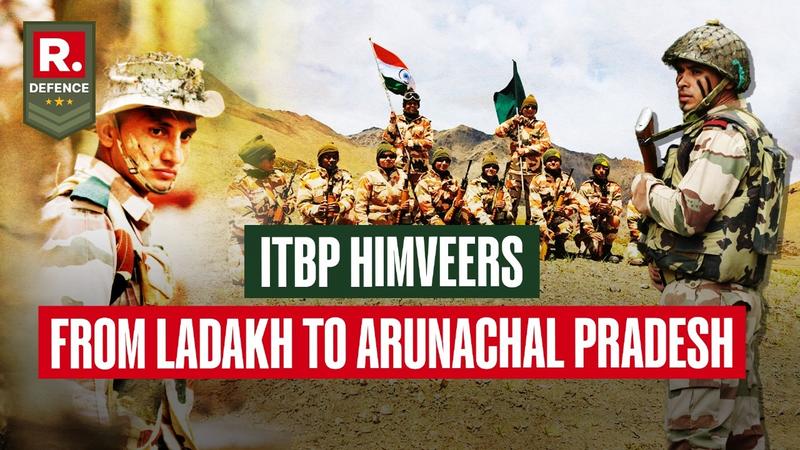Published 13:16 IST, August 15th 2024
A Day in the Life of ITBP Himveers Deployed at LAC from Ladakh to Arunachal Pradesh
Mastery of GPS technology is particularly emphasized in high-altitude areas like Chushul, where traditional navigation methods are often unreliable.

Ladakh, India: In the vast expanse of rugged terrains along the Line of Actual Control (LAC), the Indo-Tibetan Border Police (ITBP) remain steadfast in securing India's borders with China. Their daily training sessions are vital for maintaining operational readiness, particularly in map reading, tactical manoeuvres, and GPS handling, which are essential for navigating and patrolling this challenging region.
The ITBP's daily training regime is rigorous and designed to prepare troops for the demanding tasks they face. Map reading classes are a cornerstone of this training, enabling soldiers to accurately identify key areas and strategic locations. This skill is especially critical during Long Range Patrols (LRPs) along the LAC, where the ability to navigate the rugged and often treacherous landscape can mean the difference between mission success and failure.
Complementing their map-reading abilities, ITBP personnel also undergo intensive tactical training. This prepares them for various scenarios they may encounter, from skirmishes with adversaries to the challenges posed by the natural environment. The tactical drills are meticulously planned to simulate real-life situations, ensuring that the troops are ready to respond swiftly and effectively in any situation.
Mastering GPS Technology: A Critical Skill in Chushul
In high-altitude regions like Chushul, where traditional navigation methods can be severely challenged by extreme weather and difficult terrain, mastering GPS technology is indispensable. The ITBP has recognized the critical importance of this technology and ensures that every soldier is proficient in its use. Daily GPS handling classes are conducted to maintain situational awareness and coordinate movements during patrols.

These skills are not just about navigation; they are also crucial for communication and coordination. In the remote and isolated areas along the LAC, maintaining contact with headquarters and other units is vital, and GPS technology plays a key role in this.
Vigilance in the Harshest Conditions
The ITBP's primary role is to patrol the 3,488-kilometer India-China border, stretching from the Karakoram Pass in Ladakh to Diphu La in Arunachal Pradesh. The border posts manned by the ITBP are among the highest in the world, situated as high as 18,900 feet. These posts are exposed to high-velocity storms, snow blizzards, avalanches, and landslides. The hazards of high altitude and extreme cold, with temperatures plummeting to minus 40 degrees Celsius, add to the challenges faced by the ITBP.

Despite these harsh conditions, the ITBP conducts both long and short-range patrols to maintain an effective vigil on the inaccessible and uninhabited areas near the border. These patrols are crucial for monitoring any movement across the border and ensuring the security of the nation.
The ITBP 25th Battalion HQ at Tezu
The ITBP 25th Battalion Headquarters at Tezu spans 1.7 acres and is equipped with modern facilities, including:
- Advanced Hospitals – For medical care.
- Libraries and Education Centers – Supporting learning and skill development.
- Gyms and Sports Facilities – Promoting physical fitness.
- Community Centers – For recreation and social activities.
The campus also features self-sustaining efforts, with jawans growing vegetables, fruits, and flowers. This initiative helps support the large kitchens and contributes to the force's self-reliance.
Women Personnel Training
Women personnel of the ITBP are rigorously trained to operate firearms, including Light Machine Guns (LMGs), with precision and efficiency. At the Kibithu Post, women jawans practice loading and operating LMGs, showcasing their skill and readiness for high-altitude and challenging environments.

The ITBP 25th Battalion has been honoured as the Best Border Battalion among 60 service battalions and 4 specialized battalions, reflecting their exceptional performance and dedication to safeguarding India's borders. The Commanding Officer Deonath Ray of the 25th Battalion of the ITBP held a first-hand interaction with jawans at the Kibithu post with Chinese installations visible in the background.
The Commanding Officer or CO is the chief of a battalion. CO Deonath Ray personally took note of all the concerns of the jawans and shared the successes of the battalion with them and the plans and strategies for protecting and guarding the Indo-China border. Usually, this is a very private meeting conducted between the CO and the officers and Jawans. However, Republic Digital got a rare glimpse into the meetings and experienced how these are conducted.
Updated 13:16 IST, August 15th 2024




